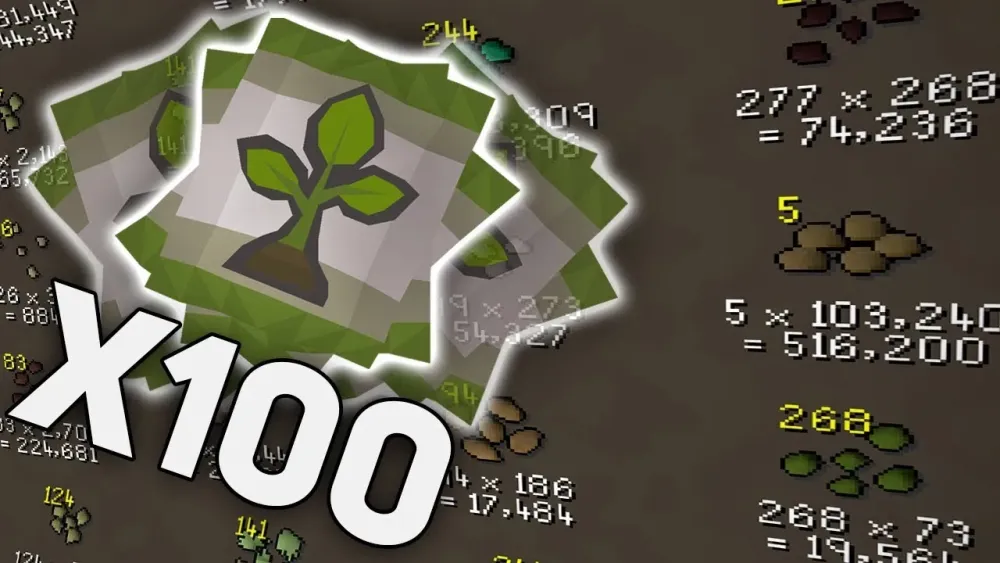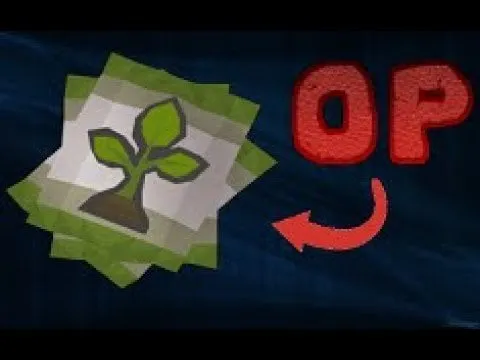Your cart is empty
Ultimate Guide to Farming Guild Contracts in OSRS

Farming Guild contracts in Old School RuneScape (OSRS) offer a dynamic way to level up your Farming skill while earning valuable rewards. Managed by Guildmaster Jane in the Farming Guild, these contracts task players with growing specific crops for seed pack rewards. Whether you’re a seasoned farmer or just starting out, this guide will walk you through everything you need to know to maximize efficiency and profits. From understanding contract tiers to advanced strategies, let’s dive into the world of Farming Guild contracts!
Farming Guild contracts are tasks assigned by Guildmaster Jane, located in the Farming Guild in Kebos Lowlands. Players are instructed to grow a specific crop within the guild’s patches, and upon completion, they receive a seed pack containing various seeds. These contracts add variety to the Farming skill, making it more engaging than traditional crop runs, and they’re a great way to stock up on seeds for future planting.
Why Choose Farming Contracts?
Contracts aren’t just busywork—they come with tangible benefits:
- Reward Variety: Seed packs can include high-value seeds like snapdragons, ranarrs, or even redwood tree seeds.
- Skill Progression: Completing contracts grants Farming XP, helping you level up faster.
- Efficiency: With the right strategy, you can complete multiple contracts quickly, saving time.
- Accessibility: Contracts are available at various skill levels, starting at 45 Farming.
How to Access the Farming Guild
To start contracts, you’ll need to reach the Farming Guild, located north of the Kebos Swamp. Here’s what you need:
- Farming Level: Minimum 45 to enter the guild (boostable).
- Hosidius Favour: 60% to access the guild’s full features.
- Teleport Options: Use a Skills Necklace, Farming Cape, or fairy ring (code CIR) to get there quickly.
Understanding Contract Tiers and Rewards

Farming contracts come in three tiers—Beginner, Intermediate, and Advanced—each tied to specific Farming level requirements and guild sections. The higher the tier, the better the rewards, but also the longer the crops take to grow.
Beginner Contracts (Level 45+)
Accessible in the guild’s east wing, these contracts are perfect for lower-level players. They involve crops like potatoes, cabbages, or guam herbs, which grow quickly but yield modest rewards.
Intermediate Contracts (Level 65+)
Unlocked in the west wing, these contracts include crops like snapdragons, watermelons, and maple trees. They strike a balance between growth time and reward value, making them a popular choice.
Advanced Contracts (Level 85+)
Available in the north wing, these are the toughest contracts, featuring crops like redwood trees, magic trees, and celastrus trees. The seed packs from these contracts can be highly lucrative, often containing rare seeds.
| Tier | Farming Level | Example Crops | Seed Pack Tier |
|---|---|---|---|
| Beginner | 45 | Potatoes, Guam, Strawberries | 1-2 |
| Intermediate | 65 | Snapdragons, Watermelons, Maple Trees | 3-4 |
| Advanced | 85 | Redwood Trees, Magic Trees, Celastrus | 5 |
Seed Pack Rewards
Seed packs are the main draw of contracts, with their contents scaling by tier. For example:
- Tier 1-2: Common seeds like cabbage or marigolds (avg. value ~19k coins).
- Tier 3-4: Mid-tier seeds like snapdragons or yew trees (avg. value ~45k coins).
- Tier 5: High-value seeds like redwoods or dragonfruit (avg. value ~75k+ coins).
Pro tip: Trading spirit seeds to Jane guarantees a Tier 5 pack, boosting your profits!
How to Complete Farming Contracts Efficiently
Completing contracts is straightforward, but efficiency is key to maximizing rewards. Here’s how it works and how to optimize your approach.
Contract Mechanics
When you speak to Guildmaster Jane, she assigns a crop to grow in a specific guild patch. You complete the contract by either:
- Checking Health: For crops like trees or cacti, check their health once fully grown.
- Harvesting: For crops like herbs or allotments, harvest the patch completely.
If the crop is already planted and not yet checked/harvested, it counts toward the contract—no need to replant!
Cancelling Contracts
Got a contract for a slow-growing crop like a redwood tree? You can ask Jane, “Do you have anything easier?” to swap it for a lower-tier contract. Note that Beginner contracts can’t be cancelled, so choose wisely!
Pre-Planting Strategy
The most efficient way to complete contracts is to pre-plant crops before getting assigned a contract. This way, you can instantly complete tasks by checking health or harvesting. Here’s a suggested pre-planting setup:
- Tree Patch: Maple or Yew (common in Intermediate/Advanced contracts).
- Herb Patch: Snapdragon or Kwuarm (fast-growing, high-value).
- Allotments: Watermelons or Snape Grass (quick and reliable).
- Bush Patch: White Berries or Poison Ivy (Poison Ivy can’t die!).
- Cactus Patch: Regular Cactus (takes ~8 hours, common contract).
After completing a contract, replant immediately to keep patches ready for the next task.
Maximizing Profits and XP
Farming contracts can be a goldmine if you play your cards right. Here are advanced tips to boost both your XP and coin gains.
Focus on Higher Tiers
Once you hit 65 or 85 Farming, prioritize Intermediate or Advanced contracts. The seed packs from these tiers often contain seeds worth tens of thousands of coins, and the XP from growing crops like magic trees or snapdragons adds up fast.
Use Ultracompost
Always use ultracompost to reduce crop death rates and increase yields. This is especially important for herbs, which can net you extra produce for Herblore training or selling.
Protect Valuable Crops
For high-level trees (e.g., magic or palm trees), pay the nearby farmer to protect them. The cost is often outweighed by the XP and contract rewards. For example:
- Palm Tree: 15 coconuts to protect (~15k coins).
- Magic Tree: 25 coconuts (~25k coins).
Combine with Herb Runs
Since the Farming Guild has a herb patch, integrate contract checks into your daily herb runs. This saves time and lets you complete contracts passively while farming herbs like ranarrs or toadflax for extra profit.
Leverage the Seed Vault
The guild’s Seed Vault is a game-changer. Store all your seeds here for easy access, and set up a “Favourites” tab with commonly assigned contract seeds (e.g., snapdragon, watermelon, maple). This streamlines replanting and keeps your bank clutter-free.
Advanced Tips and Common Mistakes to Avoid
Ready to take your contract game to the next level? Here are some pro tips and pitfalls to watch out for.
Track Your Contracts
Speak to Jane to check how many contracts you’ve completed. This helps you gauge your progress and plan daily goals. You can complete up to three contracts per day (or seven with upgrades from the Waiko Reward Shop).
Plant Anima Seeds
The guild’s anima patch can grow special seeds (Attas, Iasor, Kronos) from Hespori kills. These boost crop yields, reduce disease, or speed up growth across all patches. For example:
- Attas: Increases yield (great for herbs).
- Iasor: Lowers disease chance (ideal for trees).
- Kronos: Speeds up growth (perfect for contracts).
Keep an Attas or Iasor planted for maximum efficiency.
Avoid These Mistakes
Steer clear of these common errors to save time and resources:
- Skipping Ultracompost: Without it, crops die more often, wasting seeds and time.
- Ignoring Pre-Planting: Waiting for crops to grow after getting a contract slows you down.
- Forgetting to Replant: Empty patches mean missed opportunities for instant completions.
- Not Using Boosts: Spicy stews or garden pies can help you access higher tiers early.
Hespori for Extra Rewards
While not directly tied to contracts, planting Hespori seeds (randomly obtained from contracts or harvesting) in the guild’s Hespori patch can yield anima seeds and other loot. Killing Hespori every 2-3 days adds a nice bonus to your Farming routine.
Farming Guild contracts in OSRS are a fantastic way to make Farming more interactive and rewarding. By pre-planting crops, focusing on higher tiers, and using tools like ultracompost and the Seed Vault, you can turn contracts into a steady source of XP and coins. Whether you’re aiming for 99 Farming or just want to stock up on seeds, this guide has you covered. Get out there, talk to Guildmaster Jane, and start growing your way to success!

